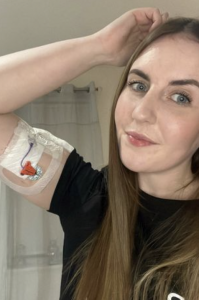Woman Finds Breast Cancer Thanks to Self-Exam; Enters Early Menopause
- A 26-year-old woman detected her breast cancer via a self-exam at home.
- She’s now “forcing” her body into early menopause to prevent the cancer from returning.
- Women aged 45 to 54 with an average risk of breast cancer should get mammograms annually. All women should perform self-exams at home.
Some cancer treatment paths may lead to early menopause. “Thankfully from what I know so far I have caught the cancer early so it is deemed treatable with chemotherapy, surgery, radiotherapy and hormonal treatment,” Graham tells The Mirror.

Sarah’s Cancer Story
Graham was sent for a mammogram, ultrasound, and biopsy after discovering a lump in her breast, reports The Mirror. She was diagnosed with breast cancer last August, and to treat her disease, she is undergoing chemotherapy, surgery, radiation, and hormone treatment. She expected to make a full recovery. Currently, Graham is going through her second round of chemotherapy. She has also made the decision to “force” her body into an early menopause with a monthly injection implant. The purpose of this is to prevent her cancer from recurring.Discussing her treatment, she says, “Currently, I’m going through chemotherapy and so far have completed my first cycle of 12 called Paclitaxel and now I am on my second chemotherapy called EC, also known as Red Devil for its colour and intensity of the drug.”
Managing Sudden Menopause After Ovarian Cancer Surgery
Self-Exam at Home for Breast Cancer
Graham discovered the lump in her breast herself. “I felt a small lump in my right breast in July doing a self-check,” she explained to The Mirror. “If I didn't self-check,” says Graham, “I could have found this cancer at a worse stage, or worryingly not even be here today to share my journey.”
It’s a good idea to perform self-checks like this at home because they can save your life. In addition to mammograms, you can also check yourself regularly at home to look for lumps. Doing this self-exam in the shower or standing in front of a mirror is a good way to try and find anything unusual on your breasts which may be a sign of cancer.
In an earlier interview, a breast cancer expert tells us, "It doesn't have to be exactly every month, but not right before the period, because their breasts may be more swollen and tender after their period," she says.
"And a lot of women say that [doing self-exams] in the shower it's easier because of the water, and it's just easier to do in that setting. There are no specific hotspots, but there are areas that women might not be as aware have also breast tissue. So if a woman feels a lump in her axilla, or her armpit, that's also important to tell their doctor about it. That could be a lymph node that has breast cancer in it."
Our expert says that a lump could also be unrelated to cancer, so don't be alarmed if you find one, just be sure to get it checked out with your doctor.
Getting to Know Your Breasts with Self-Exams
Learn more about SurvivorNet's rigorous medical review process.


